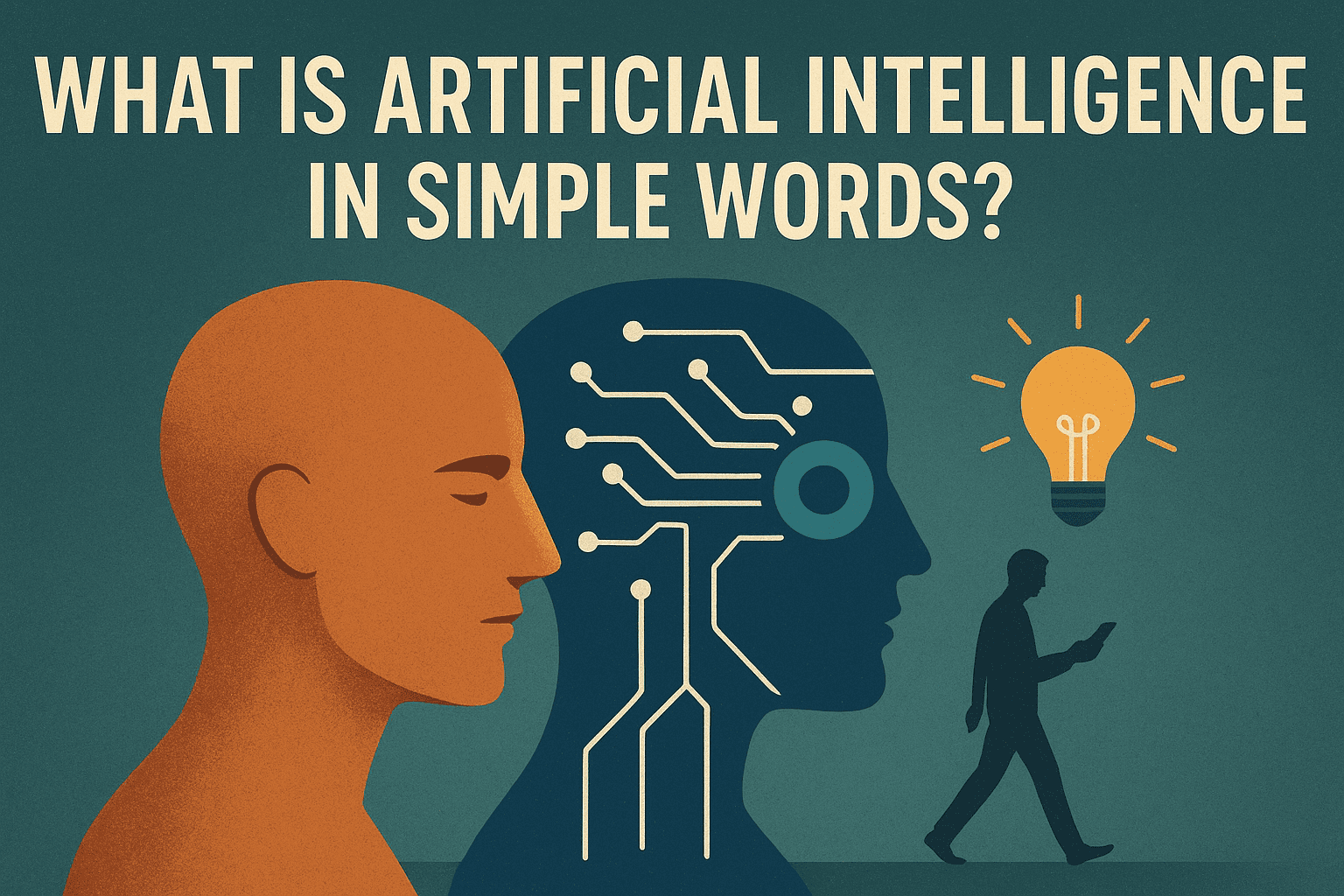Blog
What is Artificial Intelligence in Simple Words?

Understanding Artificial Intelligence: A Simple Explanation
Introduction to Artificial Intelligence
Artificial intelligence (AI) has become a buzzword in recent years, shaping how we interact with technology in our daily lives. While the concept can seem complex, understanding AI in simple terms is essential for grasping its significance and potential. In this blog post, we’ll break down what artificial intelligence is, how it works, and its impact on various sectors.
Defining Artificial Intelligence
At its core, artificial intelligence refers to the capability of machines to mimic human cognitive functions, such as learning, reasoning, problem-solving, and understanding language. The goal of AI is to create systems that can perform tasks that typically require human intelligence, thereby increasing efficiency and enhancing our ability to solve problems.
Categories of Artificial Intelligence
AI can be broadly categorized into two main types: Narrow AI and General AI.
Narrow AI
Narrow AI, also known as weak AI, refers to systems designed to perform specific tasks. Examples include virtual assistants like Siri and Alexa, recommendation systems on platforms like Netflix and Amazon, and chatbots used in customer service. These applications utilize algorithms and large datasets to perform well-defined tasks but lack the ability to operate outside their programmed functions.
General AI
General AI, or strong AI, represents a theoretical form of artificial intelligence that possesses the ability to understand, learn, and apply knowledge across a broad range of tasks, similar to human intelligence. While this level of AI remains largely speculative, it is a subject of ongoing research and debate in the AI community.
The Building Blocks of Artificial Intelligence
To better understand how artificial intelligence works, it’s important to explore its foundational elements.
Machine Learning
Machine learning (ML) is a subset of AI that focuses on developing algorithms that enable computers to learn from and make predictions based on data. Rather than being explicitly programmed for every task, ML systems learn patterns and relationships within data, allowing them to improve their performance over time. This adaptability is what makes machine learning particularly powerful.
Deep Learning
Deep learning, a further specialization of machine learning, utilizes neural networks structured similarly to the human brain. These networks consist of layers of interconnected nodes that process information in increasingly complex ways. Deep learning excels in handling vast amounts of unstructured data, such as images, sound, and text. Popular applications include facial recognition and natural language processing.
Real-World Applications of AI
Artificial intelligence has permeated various industries, revolutionizing how we approach tasks and challenges. Here are some impactful applications of AI:
Healthcare
AI technologies are transforming the healthcare sector by enabling more accurate diagnoses, personalized treatment plans, and efficient patient management. Machine learning algorithms can analyze medical images, predict disease outbreaks, and identify potential health risks. These advancements not only enhance patient care but also contribute to better resource allocation.
Finance
In the financial industry, AI is used for risk assessment, fraud detection, and algorithmic trading. Machine learning models analyze transaction data to identify patterns indicative of fraudulent activity, allowing institutions to take proactive measures. Additionally, AI-driven algorithms can execute trades at high speeds, optimizing investment strategies.
Transportation
AI is at the forefront of innovations in transportation, particularly with the development of autonomous vehicles. These self-driving cars utilize a combination of sensors, cameras, and AI algorithms to navigate complex environments, making real-time decisions based on their surroundings. The potential benefits include reduced traffic accidents and fuel efficiency, contributing to smarter urban planning.
Advantages of Artificial Intelligence
Artificial intelligence offers numerous benefits, including:
-
Increased Efficiency: AI can automate repetitive tasks, allowing human employees to focus on more strategic and creative endeavors.
-
Enhanced Decision-Making: AI systems can analyze vast amounts of data quickly, uncovering insights that may not be immediately apparent to human analysts.
- Personalization: AI enables businesses to tailor their offerings to individual preferences, improving customer satisfaction and engagement.
Challenges and Ethical Considerations
Despite its many advantages, the integration of artificial intelligence raises several challenges and ethical concerns.
Job Displacement
One of the primary concerns surrounding AI is the potential for job displacement. As machines take over routine tasks, some jobs may become obsolete, leading to economic disruption. It’s essential for society to find ways to retrain workers and create new opportunities in the evolving job market.
Privacy Issues
AI systems often rely on vast amounts of data, including personal information, to function effectively. This raises questions about data privacy and security. There is a growing need for regulations and standards to protect individuals’ data and ensure responsible AI usage.
Bias in AI
AI systems can inadvertently perpetuate biases present in their training data. For instance, if an AI model is trained on biased datasets, it may produce discriminatory outcomes, affecting decision-making in critical areas like hiring and criminal justice. Addressing bias in AI is crucial to ensure fairness and equity.
The Future of Artificial Intelligence
The future of artificial intelligence looks promising, with advancements expected to reshape numerous sectors. As research continues, we may see breakthroughs in general AI and more robust applications of narrow AI that can further enhance our daily lives. Key areas of focus include:
-
Enhanced Human-Machine Collaboration: As AI systems become more sophisticated, we can anticipate enhanced collaboration between humans and machines, leveraging each other’s strengths for greater problem-solving capabilities.
- AI and Sustainability: AI has the potential to contribute significantly to sustainability efforts, from optimizing energy use to improving agricultural practices. By leveraging AI solutions, we can address environmental challenges more effectively.
Conclusion
In summary, artificial intelligence is a transformative technology that holds the potential to revolutionize various aspects of our lives. By simulating human intelligence, AI can improve efficiency, enhance decision-making, and offer personalized experiences. While challenges and ethical considerations remain, ongoing research and development will continue to pave the way for a future where AI can be harnessed responsibly and effectively. Understanding AI is not just about technology; it’s about how we can collectively shape it to benefit humanity as a whole.

